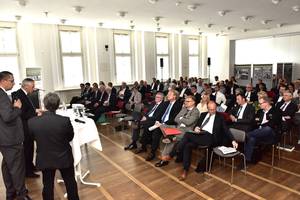The stagnation of the energy transition in the building sector is primarily due to the fact that CO2 reduction potential has not yet been sufficiently exploited due to the existing system of regulatory law and subsidies. This has negative economic, social and distributional consequences. Promising options for action could be to dispense with a fixed technology and to increase flexibility in the interaction between building insulation and low-carbon energy supply. These approaches were discussed intensively in the working group, as was the privileging of energy-efficient neighborhood approaches.
 After the opening by Petra Wesseler, President of the Federal Office for Building and Regional Planning, Prof. Dr. Dr. Klaus Töpfer first summarized the results of his working group. This was followed by the
After the opening by Petra Wesseler, President of the Federal Office for Building and Regional Planning, Prof. Dr. Dr. Klaus Töpfer first summarized the results of his working group. This was followed by the
Topics of the AG in dialogThe event will be further deepened in a series of presentations, keynote speeches and a panel discussion. Further information on the event and the work of the “Energy, Real Estate and Urban development” can be found on the homepage of the association:  www.deutscher-verband.org
www.deutscher-verband.org

